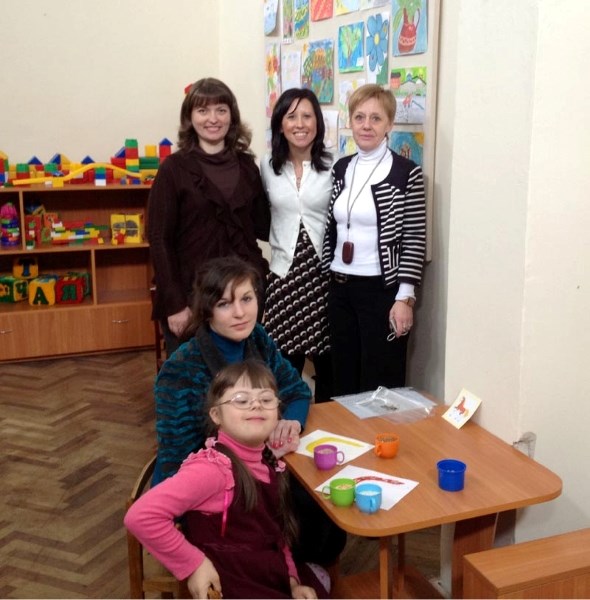Shortly after arriving in Ukraine, Laurel Beaton sat in her hotel room listening to church bells ringing and feeling she was in a dream.
Back in her homeland for the third time, she was full of conflicting emotions. Yes, she badly missed her family in Calgary, but she was excited by the teaching mission that lay ahead.
Acting as a consultant to help integrate children with special needs into a mainstream school in Lviv was an amazing opportunity to grow as a professional teacher.
It also promised to be richly rewarding, passing on her experience at Pembina Hills’ Vista Virtual School to a country where classrooms have no smart pad technology and inclusive education is still at an early stage.
Whatever Beaton expected on her first day on the job, it wasn’t what happened – a meeting with the mayor of Lviv and an interview for the national news. She found she was a big story in this western Ukrainian city of about one million people.
Everyone, it seemed, wanted to know what this young Canadian with family ties to Ukraine was hoping to achieve. What was her mission at Lviv School?
“I didn’t expect it to be so politically charged,” she said last week. “I was met by the mayor and there were camera crews everywhere and people taking videos.”
Over the next two weeks, Beaton would become accustomed to speaking to leading lights in the city’s education system. Although she understands some Ukrainian, she communicated with the help of a translator.
“I presented to teachers, educational assistants, administrators, government officials in the department of education, the mayor and university professors and students on inclusive education,” she said.
She also came across attitudes and suspicions about special needs children that may surprise many Canadians.
Some thought Down syndrome was contagious, and did not want their kids coming into contact with anyone with the condition.
“The mayor, however, was very supportive and wants inclusive education,” said Beaton.
Other notions also raised an eyebrow. For instance, some Ukrainian teachers questioned why Canada did not produce compliant children when the education system was so good.
Back in her Calgary office at Vista Virtual School, Beaton spoke last Wednesday via video to Pembina Hills trustees, who were holding their regular board meeting.
Beaton had gone to Ukraine from March 30-April 17 as a consultant on the “Inclusive Education for Children with Disabilities in Ukraine” project organized by the Canadian International Development Agency.
Staff at the project’s pilot schools at Simferopol and Lviv believed they would benefit from someone with more practical and hands-on experience of teaching special needs students.
“The goal of the project is to achieve a strong civil society and policies that support and advance inclusive education for children with disabilities in Ukraine,” said Beaton.
“The project emphasizes changing society attitudes towards disability by introducing inclusive education through inclusive policy development, civil society capacity building and preparation of professionals.”
At Lviv School, Beaton got to know two children who left a deep impression: Nastya and Sophia are the first students with Down syndrome to be integrated into a regular school in Ukraine’s history.
She observed how the students interacted with their peers and responded to teaching.
“I spent two weeks mentoring teachers to develop their inclusive education practices,” said Beaton. “During this time I observed lessons, offered feedback and suggestions, and created materials for teachers.”
Beaton was always wary about appearing to lecture teachers or to impose Canadian views. She preferred to preface her advice with the words “in Canada we might consider doing something this way …”
One suggestion was that teachers give more freedom to special needs children and not be overbearing or too protective.
“We should let them be independent,” she said. “Nastya in particular was very confident in the classroom.”
Although in a consulting role, Beaton found she could learn a lot from the Ukrainian way of teaching.
She was impressed by the way they reviewed concepts and managed classrooms without the aid of technology that Canadians took for granted.
“It was a really good learning experience for me,” she said. “But I did work really hard.”
Assistant Supt. of Education Services Mark Thiesen said Beaton’s work at Vista Virtual School had been good training for the project.
“Like most teachers, Laurel builds close relationships with her students in order to learn about their needs,” he said. “She then provides them with a variety of opportunities to learn and to express themselves. This relationship and understanding of need is the heart of inclusion.”
Thiesen said Beaton worked extensively with exceptional students in typical environments.
“Her understanding of inclusion and experience with effective strategies to support learning is why she fit the call for a teacher to go to Ukraine for this project,” he said. “It also helped she has some understanding of the Ukrainian language. And so Laurel packed her bags and went to Ukraine.”


.jpg;w=120;h=80;mode=crop)
